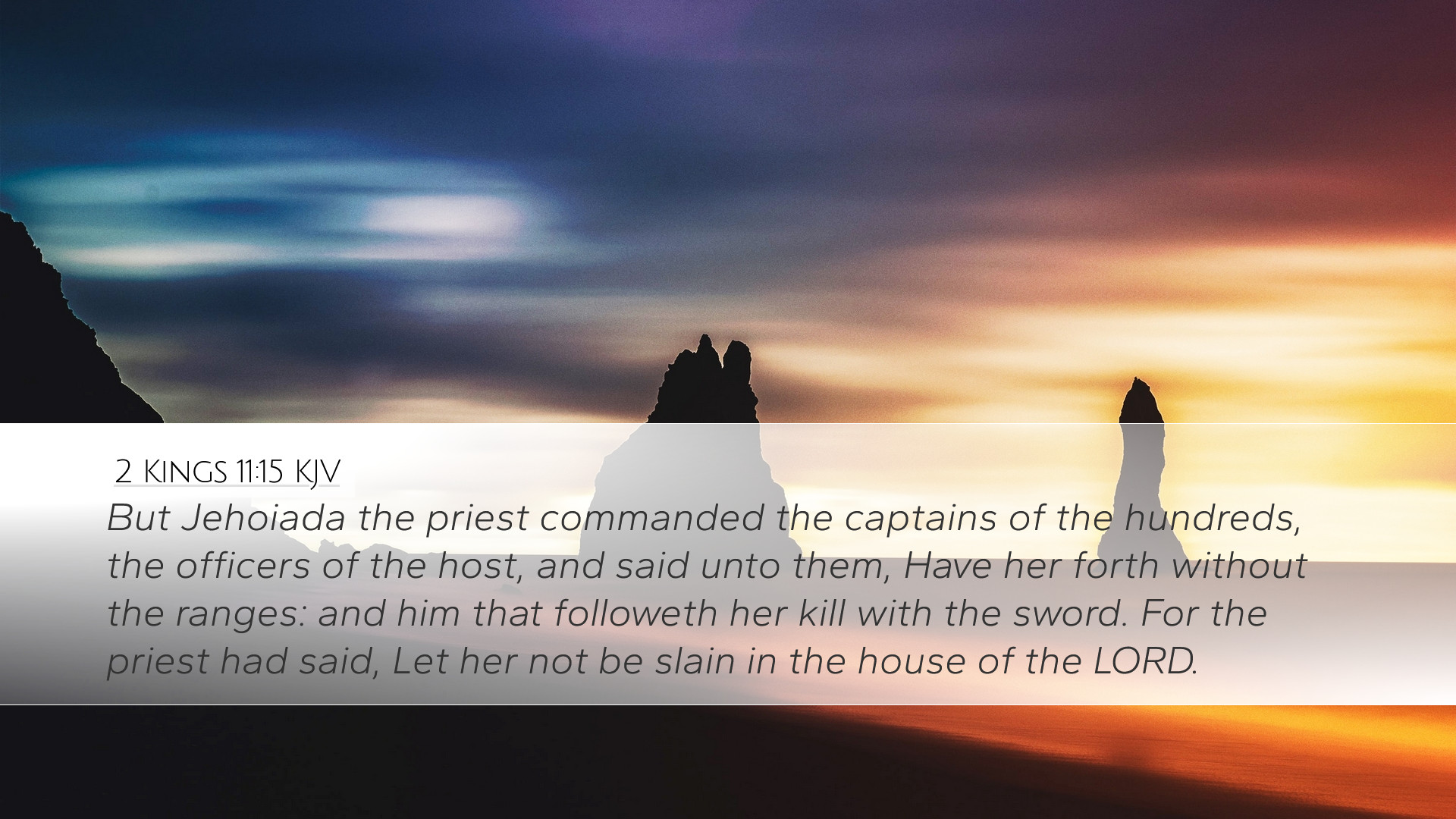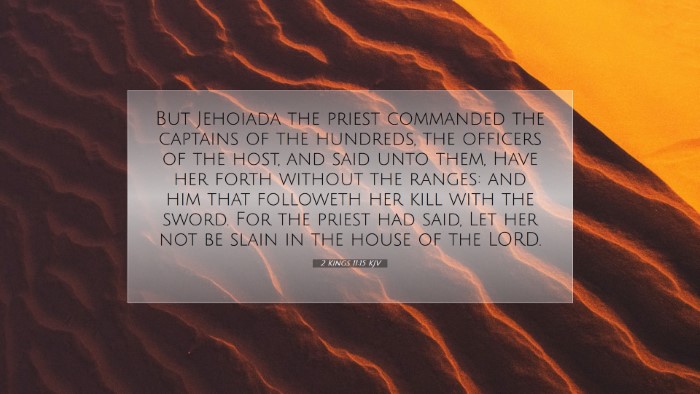Old Testament
Genesis Exodus Leviticus Numbers Deuteronomy Joshua Judges Ruth 1 Samuel 2 Samuel 1 Kings 2 Kings 1 Chronicles 2 Chronicles Ezra Nehemiah Esther Job Psalms Proverbs Ecclesiastes Song of Solomon Isaiah Jeremiah Lamentations Ezekiel Daniel Hosea Joel Amos Obadiah Jonah Micah Nahum Habakkuk Zephaniah Haggai Zechariah Malachi2 Kings 11:15
2 Kings 11:15 KJV
But Jehoiada the priest commanded the captains of the hundreds, the officers of the host, and said unto them, Have her forth without the ranges: and him that followeth her kill with the sword. For the priest had said, Let her not be slain in the house of the LORD.
2 Kings 11:15 Bible Commentary
Bible Commentary on 2 Kings 11:15
Verse: "But Jehoiada the priest commanded the captains of the hundreds, the officers of the host, and said unto them, Take her forth without the ranges: and him that followeth her kill with the sword. For the priest had said, Let her not be slain in the house of the LORD."
Introduction
This verse from 2 Kings 11:15 captures a significant moment during the tumultuous period of Judah's history, particularly focusing on the overthrow of Queen Athaliah. This commentary synthesizes insights from renowned public domain commentaries to elucidate the historical, theological, and moral implications of this passage.
Contextual Background
To fully grasp the import of 2 Kings 11:15, one must consider the broader narrative surrounding it. Athaliah seized the throne of Judah after the death of her son, Ahaziah. Her reign was marked by idolatry and the attempted annihilation of the royal line of David, which posed a substantial threat to God's covenant promise regarding the Messiah's lineage.
- Historical Context: Athaliah was the daughter of Ahab and Jezebel, embodying the worst traits of Israel's monarchy—evil, idolatry, and tyranny. Jehoiada the priest emerged as a pivotal figure who, recognizing the dire need for reform and the restoration of rightful worship, orchestrated a coup against her.
- Covenantal Themes: The preservation of the Davidic line is crucial; thus, the actions taken against Athaliah underscore the sacredness of God’s covenant with David.
Exposition of the Verse
Jehoiada's orders reveal several critical insights:
- Leadership and Responsibility: Jehoiada, as a priest, demonstrated exceptional leadership by mobilizing military officers for a righteous cause. His command reflects a clear understanding of divine justice and the seriousness of Athaliah's threat to God’s purpose.
- Justice without Defilement: Jehoiada’s instruction to avoid shedding blood in the house of the LORD illustrates a profound respect for the sanctity of the sacred space. Commentators like Matthew Henry emphasize that while judgment is necessary, it should be executed with reverence and within ethical boundaries.
- Theological Significance: This act of delivering judgment against Athaliah signifies God's sovereignty over the affairs of nations and rulers. As Adam Clarke points out, the divine hand is at work to ensure the continuation of His promised line through David.
Lessons for Today
This passage offers several profound lessons for contemporary believers:
- Righteous Leadership: Jehoiada serves as an example of how leaders can effect change within society by standing firmly against evil. Pastors and theologians today can take inspiration from his courage.
- Protecting the Sacred: Just as Jehoiada sought to protect the sanctity of the temple, Christians are called to safeguard their places of worship from corruption and maintain a pure witness.
- Divine Sovereignty: Believers can take comfort in the knowledge that God's plans will ultimately prevail, even in the face of opposition and adversity.
Conclusion
2 Kings 11:15 encapsulates a pivotal moment in the history of Judah and serves as a compelling narrative about God's faithfulness in preserving His promises. By examining Jehoiada's actions and understanding the context of the passage, pastors, students, theologians, and scholars can draw valuable insights into leadership, righteousness, and divine sovereignty. The confrontation with Athaliah illustrates the ongoing struggle against evil and the importance of maintaining fidelity to God’s covenant, lessons that remain profoundly relevant today.


